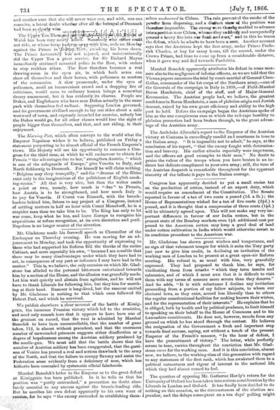Mr. Gladstone has shown great wisdom and temperance, and no
sign of that vehement temper for which it suits the Tory party just now to give him credit, in. declining an invitation of the working men of London to be present at a great open-air Reform meeting. His refusal is, as usual with him, very gracefully expressed. They had proposed to thank him, he says, for vindicating them from attacks " which they term insults and calumnies, and of which I must own that it is difficult to visit them with any terms of censure more severe than they deserve." And •he adds, "It is with reluctance I decline any invitation proceeding from a portion of my fellow subjects, to whom our electoral laws, as they exist, accord less liberally than to others the regular constitutional facilities for making known their wishes, and for the representation of their interests." He explains that he is obliged, both by health and by political prudence, to limit himself to speaking on their behalf to the House of Commons and to his Lancashire constituents. He does not, however, recede from any ground on which he has stood through the contest. He believes the resignation of the Government a fresh and important step towards final success, saying, not without a touch of the present Emperor of the French's manner, "In the hour of defeat, I have the presentiment of victory." The letter, while perfectly serene in tone, carries throughout the conviction that Mr. Glad- stone cares for the working man. And it is this conviction, almost new, we believe, to the working class of this generation with regard to any statesman of the first rank, which has awakened them to a political earnestness and vigour of interest in the national life which they had almost ceased to feel.






























 Previous page
Previous page